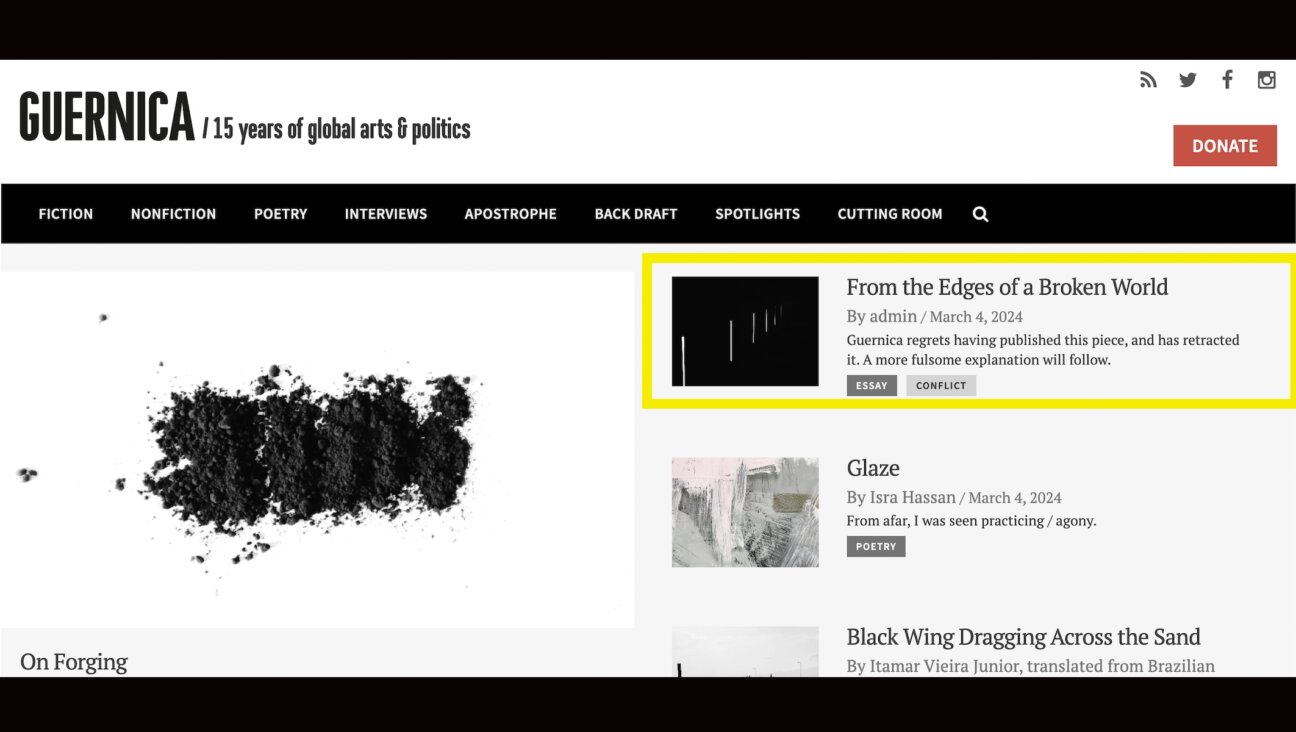More Than Ever, Time To Remember Rabin
This year, for the first time since the first anniversary of that terrible night, there will be no rally in Tel Aviv to commemorate the assassination of Yitzhak Rabin. Dalia Rabin, the slain prime minister’s daughter and chair of the Rabin Center, announced the decision. Her explanation? Public interest is waning, and the costs of the rally have become prohibitive.
Still, by Knesset law there is a national day of remembrance marked by all state institutions, a day that includes a special plenary session of the Knesset and a formal ceremony at Rabin’s grave on Mount Herzl, attended by the president and prime minister and other dignitaries.
Among those who delight in the dwindling interest in remembering Rabin, it is likely that no one is more pleased than Prime Minister Benjamin Netanyahu. But for the Knesset law, he’d surely have scuttled the commemoration himself.
Why is that? Because one cannot commemorate the Rabin assassination without remembering Rabin’s wisdom, and it is precisely Rabin’s wisdom that Netanyahu rejects.
Three examples:
In his first speech to the Knesset on becoming (for the second time) prime minister, in 1992, Rabin said: “No longer are we necessarily ‘a people that dwells alone,’ and no longer is it true that ‘the whole world is against us.’ We must overcome the sense of isolation that has held us in its thrall for almost half a century. We must join the international movement toward peace, reconciliation and cooperation that is spreading over the entire globe these days — lest we be the last to remain, all alone, in the station.”
Rabin returned to that theme frequently, perhaps most notably post-Oslo, in 1994: “We are witnessing a new wind blowing throughout the world regarding its relationship to the State of Israel: The claim that ‘the whole world is against us’ has dissipated in the spirit of peace. The world is not against us; it is with us.”
Can one imagine a message more dissonant in the time of Bibi Netanyahu? The new wind that is blowing throughout the world regarding its relationship with the State of Israel is an ill wind, bluntly summarized just the other day by Prime Minister Recep Tayyip Erdogan of Turkey: “Israel is the West’s spoiled child” — a characterization pointedly used a year earlier by The New York Times’? Thomas Friedman. Surely Netanyahu does not want to be reminded of Oslo, which he energetically sought to undermine, less still of the startling fact that even before Oslo, Rabin sought to move his fellow citizens beyond their disfiguring traumas.
A second Rabinism that must rankle Netanyahu is that Rabin spoke often of the “window of opportunity” that had suddenly opened, and of how it would not last forever. That window is now perceptibly closing; that which just a few years ago looked promising, even imminent, now seems appallingly remote. And it is plain that at every critical turn of the Netanyahu government, it is the prime minister himself (abetted by his colleagues in the government) who has worked to shut the window.
For Rabin, the window of opportunity was less a rhetorical fancy than an analytic conclusion. The Soviet Union had collapsed, and that profoundly altered the geopolitics of the Middle East. Countries that had learned to play off the Cold War and benefit from it were now required to seek the favor of the United States — and that created an unexpected opportunity for Israel. But in the near distance, Iran was rising. That, in addition to the stark volatility of Israel’s neighborhood, is why the opening window could not be thought permanent.
But Netanyahu is not a strategist; he is a trickster, ever bent on seeing what he can get away with. Turkey? There was ample opportunity to make right the now capsized relationship — but no, Israel could not bring itself to apologize. Settlements? In-your-face construction, even in the most sensitive locations. (Remember his contretemps with Vice President Joe Biden?) It is possible he envies Rabin’s strategic capacity, but he is not competent to emulate it.
Which brings me to the third source of Netanyahu’s resentment of Rabin — to wit, Rabin’s deeply genuine appreciation of America and of the crucial importance of a warm relationship between Israel and the United States. Suppose, for example, that President Clinton had publicly proposed that negotiations between Israel and the Palestinian Authority should be based on the 1967 borders (the “Green Line”) with mutually agreed upon land swaps. Is it even remotely conceivable that the very next day, before a joint session of the Congress of the United Sates, Rabin would have chosen to misquote Clinton? Netanyahu’s readiness to prefer ovations from a craven Congress to a productive relationship with President Obama is the mark of the man. And it is, as he well knows, a failing mark.
All that said, and meant, there is an alternative way of understanding Netanyahu: Bibi Netanyahu is his father’s son and thinks himself as Ze’ev Jabotinsky’s heir. He behaves as he does not only because of personal failings, but also because he is an ideologue who neither desires peace nor pursues it. He is happy to subvert the peace process so long as he can plausibly blame the other side. He complains that Israel has no partner for peace, which is at best a partial truth, while knowing that the Palestinians have no partner for peace, for peace is not his intention. Yet he knows who preceded him: the distinguished warrior turned would-be peacemaker.
Contact Leonard Fein at [email protected]

I hope you appreciated this article. Before you go, I’d like to ask you to please support the Forward’s award-winning journalism this Passover.
In this age of misinformation, our work is needed like never before. We report on the news that matters most to American Jews, driven by truth, not ideology.
At a time when newsrooms are closing or cutting back, the Forward has removed its paywall. That means for the first time in our 126-year history, Forward journalism is free to everyone, everywhere. With an ongoing war, rising antisemitism, and a flood of disinformation that may affect the upcoming election, we believe that free and open access to Jewish journalism is imperative.
Readers like you make it all possible. Right now, we’re in the middle of our Passover Pledge Drive and we need 500 people to step up and make a gift to sustain our trustworthy, independent journalism.
Make a gift of any size and become a Forward member today. You’ll support our mission to tell the American Jewish story fully and fairly.
— Rachel Fishman Feddersen, Publisher and CEO
Join our mission to tell the Jewish story fully and fairly.
Our Goal: 500 gifts during our Passover Pledge Drive!
























